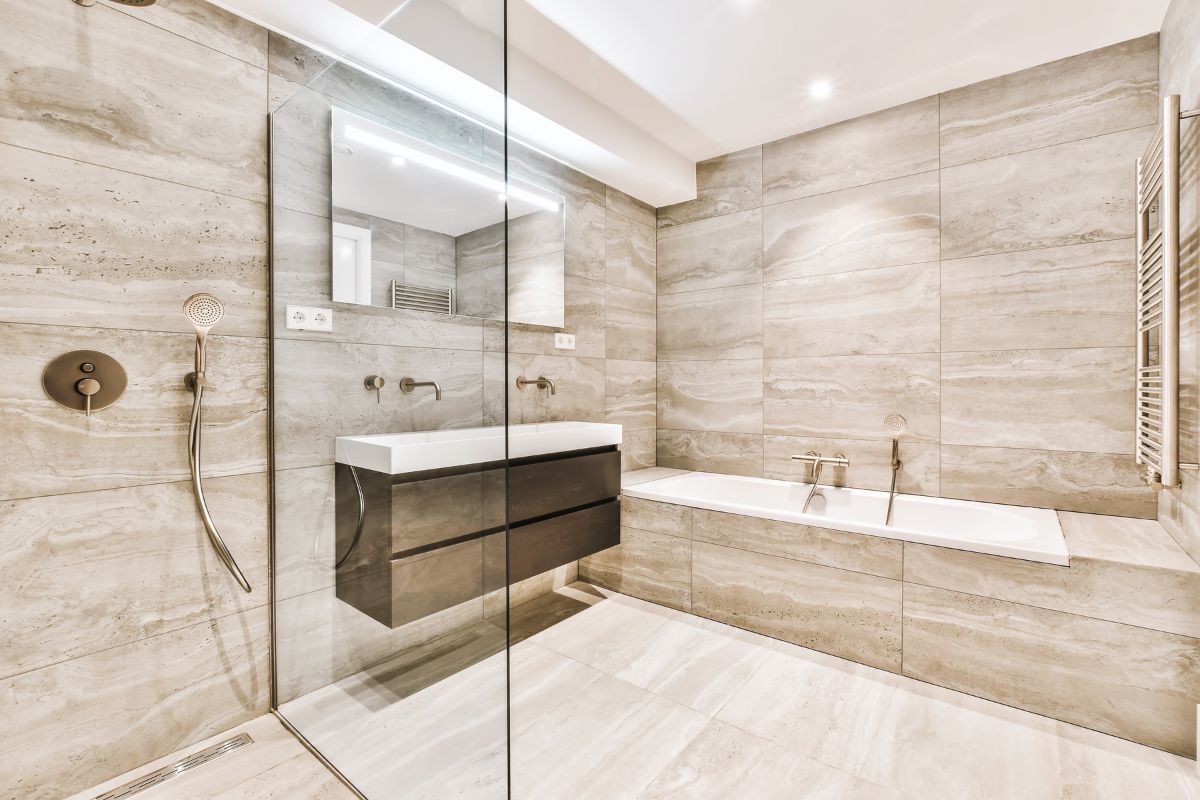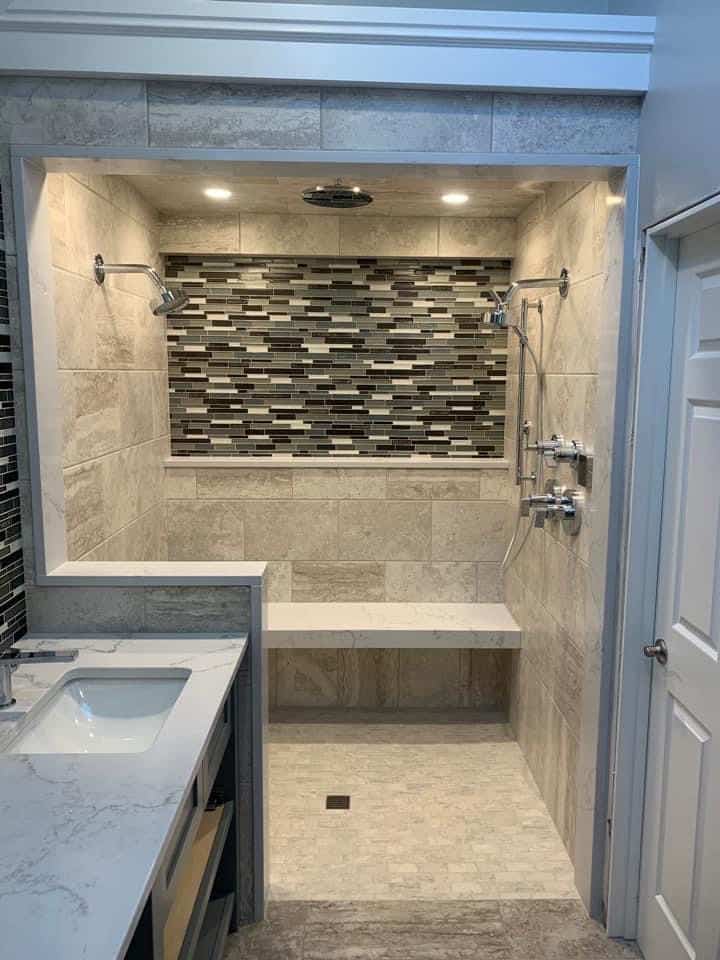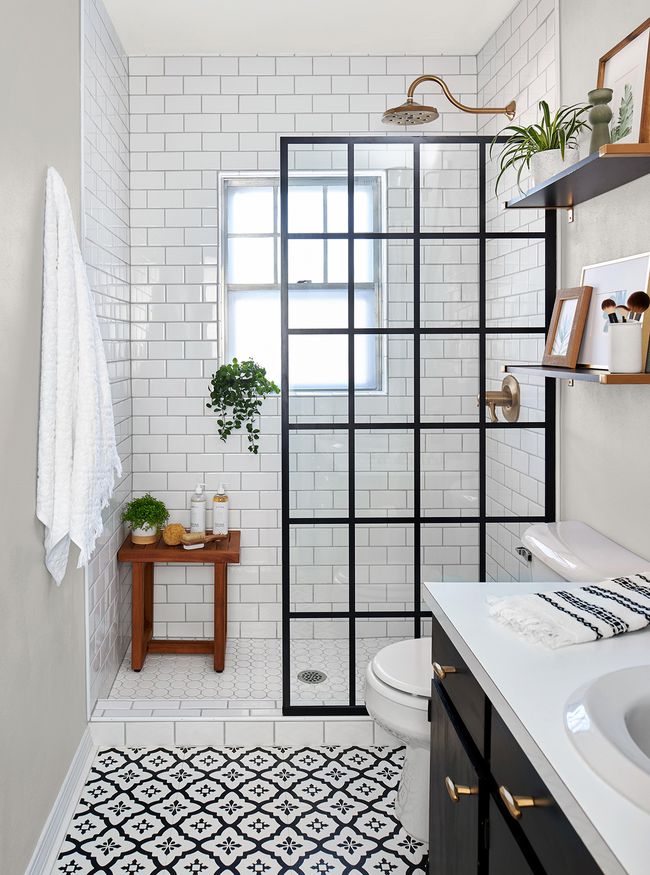Choosing Your Tile. Which Is Better?

When choosing the tile you want to install, you need to consider a few things.
- Will the tile be exposed to water or moisture?
- Will the tile be in a high-traffic area?
- What type of look do you want?
There are millions of tile choices and many different costs. For example, some ceramic tiles cost around $1.50/sq ft while others can be upwards of $100/ sq ft. The truth is that both are made the same way. First, they’re baked and glazed for the desired color or texture.
The most expensive isn’t always the better choice when choosing your tile.
Ceramic Tiles
Ceramic tiles are kiln-fired at a lower temperature than porcelain tiles, making them less dense, softer, and porous. The clay used in its composition is also less refined, making it a more affordable, albeit less durable, option. Many homeowners opt to install ceramic tiles as flooring, especially in warm climates, where the natural coolness of the tile becomes a welcome perk in the summer months.
Tile is a versatile and affordable option for those in the market for large tile quantities. It costs significantly less than porcelain, but it’s also easier to install. Thanks to its relatively soft surface, homeowners can cut ceramic tile with a simple tile cutter —a piece of cake when considering the far more involved process of cutting porcelain tile. What’s more, ceramic tiles have an attractive clean-lined appearance, and the durable glazed finish can be customized in a variety of colors and patterns. However, ceramic tile is not as durable as porcelain, and homeowners must clear away spills quickly due to its relatively high absorption rate.
It’s best to avoid using ceramic tile in areas often exposed to moisture, such as the shower and patio. Also, due in part to its tendency to absorb water, ceramic tile requires weekly deep-cleaning instead of monthly. The coolness of the tile might feel nice in the summer, but it can also be uncomfortably cold during the winter. Ceramic tiles are coated with a glaze, and if the tile cracks or chips, the clay material underneath the glaze will show through. Homeowners should consider using ceramic tiles in low or moderate foot traffic areas.

Porcelain Tiles
Porcelain tile is refined clay and other natural elements. After being kiln-fired, the tiles are either left in their natural state or transformed to look like stone, wood, concrete, or other materials. The clay-based construction makes porcelain tile a subtype of ceramic tiles; however, porcelain tile has a hardier construction and more outstanding durability than non-porcelain ceramic tile varieties.
Homeowners can choose either glazed or unglazed porcelain tiles. Unglazed or full-bodied tiles have color running through the entire thickness (as opposed to a glaze placed on the top), making them longer lasting and more resistant to chipping. The most durable tile on the market, porcelain, is more rigid, denser, tougher, and less porous than ceramic tile. It also has a meager absorption rate, meaning it’s virtually impervious to water damage, even after prolonged exposure. This characteristic makes it an ideal choice for bathrooms, laundry rooms, patios, and other moisture-prone areas. Since porcelain tile can withstand heavy traffic over long periods, it works well as a flooring and countertop material. Despite its durability and versatility, porcelain has two significant drawbacks: price and ease of cutting.
Porcelain tile costs at least 60 percent more than its ceramic competitors. Also, due to its density and hardness, homeowners typically require a wet saw with a diamond blade to cut cleanly through the material. Professional installation is preferred for a flawless finish with undamaged tiles. If you’re looking to take on a budget-friendly DIY installation project, ceramic tile might be the wiser choice. Porcelain Tile Upkeep and Maintenance in general, porcelain is very forgiving when spills and scratches; it’s hard to damage and relatively simple to keep clean. Sweep and vacuum porcelain tile once or twice per week, depending on how much traffic it experiences.
Once a month, use a vinegar-and-water solution or tile-friendly commercial cleanser to banish dirt and day-to-day build-up. If you have glazed tile, utilize a mop. If you have unglazed or textured tile, rely on scrub with a soft-bristle brush instead. Avoid using oil-based products, waxes, abrasive scrubbers, and anything containing bleach or ammonia. Follow up with a hot water rinse, and dry thoroughly with a towel or microfiber cloth. For step-by-step guidance, consult our tutorial for cleaning porcelain tiles, which breaks down the glazed, unglazed, and even textured tiles routine. Book a free consultation today a create your dream shower and bath. We carry the showroom to your home and include a lifetime warranty.

Natural Stone Tiles
Natural Stone Tiles are a very popular floor, countertop and wall option among homeowners today. This popularity has helped contribute to the wide variety of styles and colors we have to choose from. In fact, there are so many choices, selecting the right one for you can be a little overwhelming. In order to help educate you on Natural Stone and help make your selection process a little more productive, here are three things you should know about Natural Stone Tile:
- Natural Stone Tiles are susceptible to staining and need to be sealed after installation. The reason for this is the fact that Natural Stone is porous and the sealer covers those pores, making it less susceptible to stains and easier to clean. While there are some sealers that do last for life, for the average sealer, it is recommended that you reseal every 1 to 2 years as part of your maintenance routine. When selecting the right sealer for you stone, you want to make sure you get a high quality sealer. A sealer is protecting your investment and you pretty much “get what you pay for”. It is very important to make sure that your Natural Stone Tiles are clean and free from any debris before sealing. Anything that is on the tile during the sealing process will be locked in and unable to be removed.
- Natural Stone Tiles are natural and not man-made. Because of this, you will get variance from tile to tile and no two tiles will look alike. This is important to understand because many times the color shade will be slightly different as well. Some stone types have more variance than others. Because of this variance, it’s always a good idea to purchase a little extra material for your project. This will ensure that you will be able to weed out any tiles that you don’t like, and also you will have matching tile down the road if you are ever in need of a repair. The chance of you finding a matching tile down the road is very rare.
- Depending on the type, each Natural Stone Tile has its own recommended uses. For example, granite tiles work great in all areas of the house including the kitchen due to being one of the least porous Natural Stones. More porous stones like Travertine, Marble, and Limestone are not recommend for Kitchen Countertops but work well on floors and in bathroom walls and countertops. These more porous stones are more likely to stain and harbor food bacteria found on kitchen counters. Slate is one of the few natural stone tiles that can hold up through climate and temperature changes and is suitable for outdoor use.
There are many other types of tile including ones with metal added, glass, and thousands of mosaics with a mixture of different elements, but 90+% of the tile industry is made up of ceramic, porcelain and natural stone.
FREE IN HOME CONSULTATION
At Solace Showers, we've built our business on helping clients bring their wildest renovation dreams into reality. Contact us to book a consultation for your custom tile shower design. We look forward to working with you!

